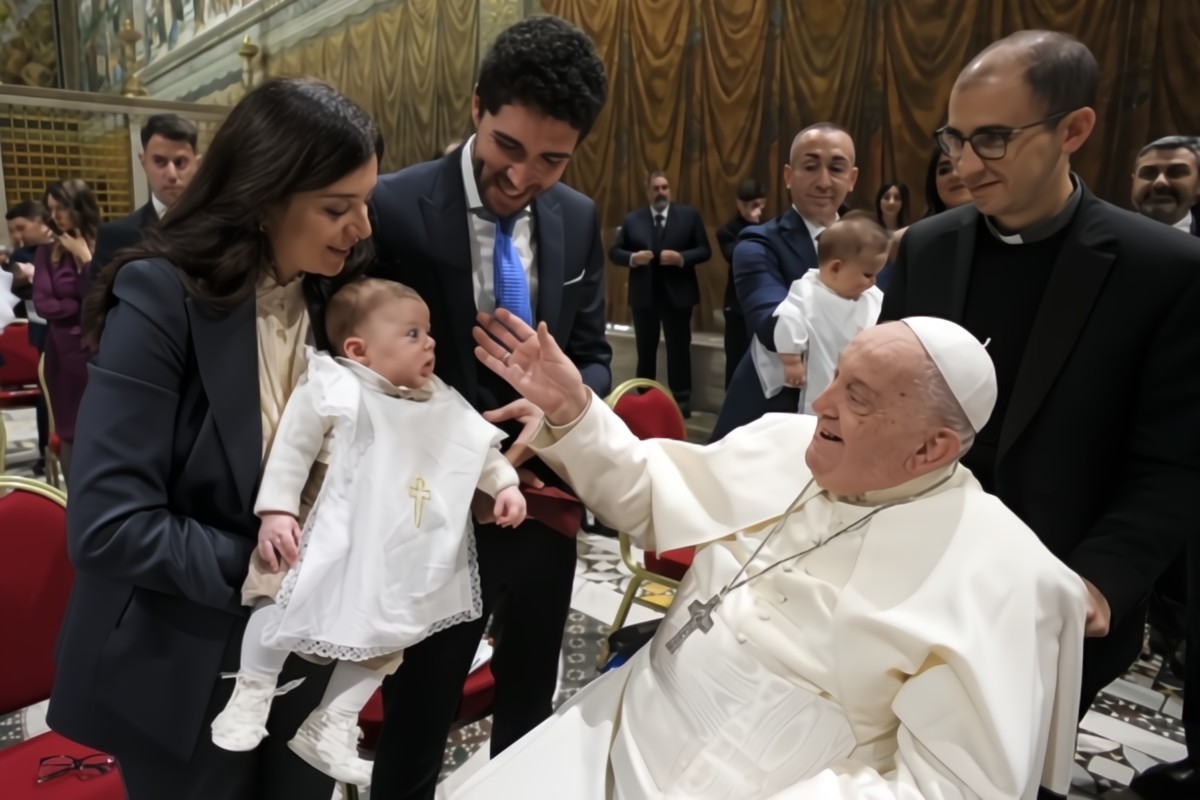 Dear readers, Catholic Online was de-platformed by Shopify for our pro-life beliefs. They shut down our Catholic Online, Catholic Online School, Prayer Candles, and Catholic Online Learning Resources—essential faith tools serving over 1.4 million students and millions of families worldwide. Our founders, now in their 70's, just gave their entire life savings to protect this mission. But fewer than 2% of readers donate. If everyone gave just $5, the cost of a coffee, we could rebuild stronger and keep Catholic education free for all. Stand with us in faith. Thank you. Help Now >
Dear readers, Catholic Online was de-platformed by Shopify for our pro-life beliefs. They shut down our Catholic Online, Catholic Online School, Prayer Candles, and Catholic Online Learning Resources—essential faith tools serving over 1.4 million students and millions of families worldwide. Our founders, now in their 70's, just gave their entire life savings to protect this mission. But fewer than 2% of readers donate. If everyone gave just $5, the cost of a coffee, we could rebuild stronger and keep Catholic education free for all. Stand with us in faith. Thank you. Help Now >
Beyond Left and Right: Time for Good Governance
FREE Catholic Classes
The principle of subsidiarity, a social ordering principle, lies at the heart of Catholic Social teaching.
Highlights
Catholic Online (https://www.catholic.org)
6/14/2009 (1 decade ago)
Published in Politics & Policy
CHESAPEAKE, Va. (Catholic Online) - It seems no matter where you look these days there is an effort to expand the role of the Federal Government in the United States. Putting aside the very real social justice issues surrounding the need for a better vehicle for the delivery of health care services to all of our citizens, there should be a serious caution when we consider "federalizing" the entire process.
First, it will lead to serious moral problems. The most obvious example concerns fundamental human rights. The current positive law in the United States violates the Natural Law Right to Life by creating out of thin air a 'right' to kill our first neighbors in the womb. It also places the Police Power of the State behind a woman's 'choice' to take the life of the child in her womb. A federalized National Health Care Program will likely declare procured abortion to be a "health service" and pay for it by using tax dollars extracted from all citizens. This does not even consider the conscience issues of Pro-Life Medical professionals and institutions who refuse to participate in the intrinsically evil act of providing intentional abortions to those who request them.
However, there is another serious policy question which needs to be asked. That is whether the centralizing of such an important matter as the delivery of health care services through an increasingly bloated federalized bureaucracy is a violation of the principle of subsidiarity, a social ordering principle which lies at the heart of Catholic Social teaching? The Catechism of the Catholic Church makes these astute observations:
"All men are called to the same end: God himself. There is a certain resemblance between the union of the divine persons and the fraternity that men are to establish among themselves in truth and love. Love of neighbor is inseparable from love for God. The human person needs to live in society. Society is not for him an extraneous addition but a requirement of his nature. Through the exchange with others, mutual service and dialogue with his brethren, man develops his potential; he thus responds to his vocation. A society is a group of persons bound together organically by a principle of unity that goes beyond each one of them. As an assembly that is at once visible and spiritual, a society endures through time: it gathers up the past and prepares for the future. By means of society, each man is established as an "heir" and receives certain "talents" that enrich his identity and whose fruits he must develop. He rightly owes loyalty to the communities of which he is part and respect to those in authority who have charge of the common good.
"Each community is defined by its purpose and consequently obeys specific rules; but "the human person . . . is and ought to be the principle, the subject and the end of all social institutions. Certain societies, such as the family and the state, correspond more directly to the nature of man; they are necessary to him. To promote the participation of the greatest number in the life of a society, the creation of voluntary associations and institutions must be encouraged "on both national and international levels, which relate to economic and social goals, to cultural and recreational activities, to sport, to various professions, and to political affairs.
"This "socialization" also expresses the natural tendency for human beings to associate with one another for the sake of attaining objectives that exceed individual capacities. It develops the qualities of the person, especially the sense of initiative and responsibility, and helps guarantee his rights. Socialization also presents dangers. Excessive intervention by the state can threaten personal freedom and initiative. The teaching of the Church has elaborated the principle of subsidiarity, according to which "a community of a higher order should not interfere in the internal life of a community of a lower order, depriving the latter of its functions, but rather should support it in case of need and help to co- ordinate its activity with the activities of the rest of society, always with a view to the common good."
"God has not willed to reserve to himself all exercise of power. He entrusts to every creature the functions it is capable of performing, according to the capacities of its own nature. This mode of governance ought to be followed in social life. The way God acts in governing the world, which bears witness to such great regard for human freedom, should inspire the wisdom of those who govern human communities. They should behave as ministers of divine providence. The principle of subsidiarity is opposed to all forms of collectivism. It sets limits for state intervention. It aims at harmonizing the relationships between individuals and societies. It tends toward the establishment of true international order. (CCC, Article 1, #1878 - 1885)
There is very little discussion about the principle of subsidiarity in Catholic circles these days. My experience is that many Catholics do not even know that there is such a principle within the Social Doctrine of the Catholic Church. Instead they have been caught up in the charged rhetoric from both the political left and the political right for far too long. What is really needed is an intelligent, creative discussion of the underlying issue, what constitutes "good" governance. Let me explain.
If you listen to some voices in the debate over health care, you hear a siren song in some segments of the "right" which is anti-government. This is at odds with the insights summarized in our Catechism. You have heard some of these voices paraphrasing the American founders so as to imply that government itself is the problem. Some on the right quote such lines as "he who governs best governs least" or "government is the problem" without addressing the deeper issues. Sometimes the use of this rhetoric reveals a misunderstanding of both the nature and the value of governance. When the right views all government as the problem, the right goes wrong.
If you listen to some of the voices on what I call the "loony left" (not including all those who would be considered "left"), they seem to want to federalize everything. They also question the empathy of anyone who disagrees with their collectivist and statist model of big federalized governance. Such an approach is a disaster waiting to happen morally, politically, socially and economically. What I am calling the loony left are those on the political left who actually want a collectivist and statist model of governance. If so, they threaten human freedom and fail to understand and honor the role of mediating institutions, the first of which is the family, the smallest governing unit and first vital cell of society.
Catholics considering models and methods of governing should begin with the positive; governing is something good. God governs and invites us all into this effort. We were made to give ourselves in love and service to the other; to form societies and communities of interest and association. The first society is the family wherein we learn socialization and are schooled in virtues. It must always be the guide and measuring stick for any broader social and governing structure. The question should come down to whether the model or method of governance being considered is "good", in a dual sense of the word.
First, is it Moral? Does it recognize the existence of a higher law and fundamental human rights which have their source not in civil government but in the very nature and dignity of the human person as created in the Image of God? Does the model and means of governance then respect the dignity of every human person, recognize the primacy of the family and truly serve the common good? Does it promote genuine human freedom, creativity and initiative?
Next, is the model and means of governing "good" in the sense of being effective, efficient and just? Does it respect the individual human person? Does it defer to the smallest governing unit of the family? Does it respect the other proper mediating institutions and defer first to them before assigning the task it attempts to accomplish to the centralized or federal government?
We should reject the rhetoric of the right when it is rooted in a distrust and mischaracterization of governing itself as being evil. We should reject the rhetoric of the left when it is loony. It is time for Catholics to take the principles set forth in the Social teaching of the Catholic Church - which is neither left nor right - and offer models, methods and means of governance which provide an alternative to the mistakes of both the loony left and the misguided right. We should propose instead a model of good governance.
Good governance must recognize fundamental human rights, the first of which is the right to life. It must acknowledge the role of the mediating institutions and associations beginning with the family and support their function as the best place for governance to first occur. This model of governance, respecting both solidarity and subsidiarity, could help us to develop a vehicle for the delivery of services such as health care which defers to the family and the mediating associations while also respecting human and economic freedom.
The Federal Government should be the last place, not the first place, to which we look in our efforts to fashion a truly just society and an effective model of self government. Does it have a role? Yes, but the principle of subsidiarity should be applied. It is time to move beyond left and right. It is time for good governance.
---
'Help Give every Student and Teacher FREE resources for a world-class Moral Catholic Education'
Copyright 2021 - Distributed by Catholic Online
Join the Movement
When you sign up below, you don't just join an email list - you're joining an entire movement for Free world class Catholic education.

-

-
Mysteries of the Rosary
-
St. Faustina Kowalska
-
Litany of the Blessed Virgin Mary
-
Saint of the Day for Wednesday, Oct 4th, 2023
-
Popular Saints
-
St. Francis of Assisi
-
Bible
-
Female / Women Saints
-
7 Morning Prayers you need to get your day started with God
-
Litany of the Blessed Virgin Mary
Introducing 'Journey with the Messiah' - A Revolutionary Way to Experience the Bible
-

9 Harmful Practices to Avoid When Confronting the Devil
-

Pope Francis Celebrates the Feast of the Baptism of the Lord with Special Emphasis on the Gift of Faith
-
New Respiratory Virus Spreads Across China: Is it a Threat to the Global Community?
-
Resurgent Nuclear Threats and the Call for Peace
Daily Catholic
 Daily Readings for Wednesday, January 15, 2025
Daily Readings for Wednesday, January 15, 2025 St. Paul the Hermit: Saint of the Day for Wednesday, January 15, 2025
St. Paul the Hermit: Saint of the Day for Wednesday, January 15, 2025 Prayer for a Blessing on the New Year: Prayer of the Day for Tuesday, December 31, 2024
Prayer for a Blessing on the New Year: Prayer of the Day for Tuesday, December 31, 2024- Daily Readings for Tuesday, January 14, 2025
- St. Felix of Nola: Saint of the Day for Tuesday, January 14, 2025
- St. Theresa of the Child Jesus: Prayer of the Day for Monday, December 30, 2024
![]()
Copyright 2024 Catholic Online. All materials contained on this site, whether written, audible or visual are the exclusive property of Catholic Online and are protected under U.S. and International copyright laws, © Copyright 2024 Catholic Online. Any unauthorized use, without prior written consent of Catholic Online is strictly forbidden and prohibited.
Catholic Online is a Project of Your Catholic Voice Foundation, a Not-for-Profit Corporation. Your Catholic Voice Foundation has been granted a recognition of tax exemption under Section 501(c)(3) of the Internal Revenue Code. Federal Tax Identification Number: 81-0596847. Your gift is tax-deductible as allowed by law.








 Daily Readings for Wednesday, January 15, 2025
Daily Readings for Wednesday, January 15, 2025 St. Paul the Hermit: Saint of the Day for Wednesday, January 15, 2025
St. Paul the Hermit: Saint of the Day for Wednesday, January 15, 2025 Prayer for a Blessing on the New Year: Prayer of the Day for Tuesday, December 31, 2024
Prayer for a Blessing on the New Year: Prayer of the Day for Tuesday, December 31, 2024

